Healthy child Guidelines
Establishing healthy habits early sets kids up for a long and happy life. On this page you’ll find the government guidelines, and lots of tips on how to support your kids to eat well, move regularly and grow into healthy adults. But remember that every family and every child is different! If you have any concerns about your child's growth and development, speak to a health professional.
Eating well
Every child is different, and we encourage everyone to eat to appetite. If you are concerned that your child is consistently eating a lot more or a lot less than the guidelines, speak to your GP or child health nurse. We've got loads more information and practical ideas in our Healthy Eating Hub.
How much food does my child need each day?
|
Grain/ |
Vegetables |
Fruit |
Dairy/ |
Meat/ |
Discretionary |
|
|---|---|---|---|---|---|---|
| 4-7 years |
3 - 4 serves |
4 serves | 2 serves | 3 serves | ½ - 1 serves | 1 - 2 serves |
| 8-11 years |
4 - 6 serves |
4 - 5 serves | 1 - 2 serves | 3 serves | 1 - 1½ serves | 1 - 2 serves |
|
12-18 years |
4 - 7 serves | 5 - 9 serves | 3 - 4 serves | 3 - 5 serves | 1 - 2 serves | 1 - 3 serves |
What is a serve?
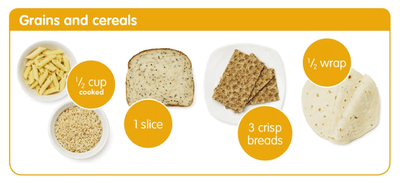
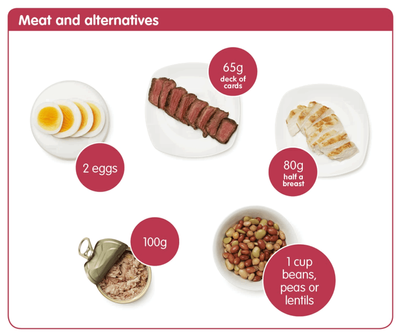
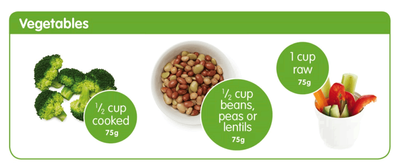
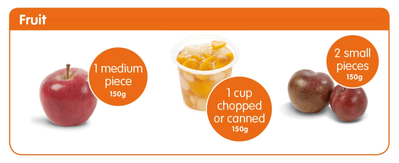
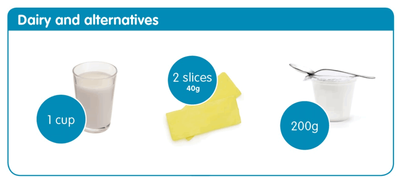
Tips for parents!
- Children copy what they see around them. Be a positive role model and teach your children about healthy living through your own food choices.
- Help kids develop a healthy relationship with food by letting food 'just be food' and don't use it as a reward or punishment (e.g. avoid things like "no ice-cream unless you eat your broccoli").
- Let your child help choose and prepare healthy meals and snacks.
- Encourage your child to eat slowly and recognise when they are full. It's OK for them to leave food on their plate.
- 'Division of responsibility' is one way to help children become adventurous eaters at their own pace. Caregivers are responsible for what food is put out, and when. Children are responsible for which foods they choose from that selection, and how much they eat.
- View the Australian guide to healthy eating for children and adolescents.
- Learn more about the food groups and healthy eating over here.
- Get practical ideas about how to eat well as a family over here.
Movement and activity
Physical activity
Children and young people aged 5-17 need at least 60 minutes of moderate to vigorous physical activity every day. 'Moderate' physical activity uses the major muscle groups and will increase their heart rate. 'Vigorous' activity will get them huffing and puffing.
Include muscle strengthening activities at least 3 times a week. This is activities like running, climbing, monkey-bars, yoga, push-ups etc.
Screen time
No more than 2 hours of recreational screen time each day. This includes activities such as watching TV, playing video games or surfing the net.
Sleep
- For children aged 5-13 years aim for 9-11 hours uninterrupted sleep
- For young people aged 14-17 years aim for 8-10 hours uninterrupted sleep

Tips for parents!
- Children copy what they see around them. Be a positive role model and teach your children about healthy living through your own activity and screen-time choices.
- Talk about the benefits of active living, including social connectedness, fun, and environmental benefits, as well as the physical health benefits.
- Incorporate movement into everyday activities, like taking active transport and getting kids involved in chores.
- View the government physical activity guidelines for kids aged 5-17.
- Get practical ideas about how to get moving as a family over here.
Growth and body weight
All children grow at different rates and it's not possible to tell whether a child is healthy just by looking at them. Normal growth during childhood and adolescence involves weight gain and an increase in body size. Too little or too much food, or an imbalance of nutrients over a period of time, can alter this physical growth.
If your child experiences more than two of the symptoms on this checklist, they may benefit from a visit to a GP for a health assessment. Your GP will be able to assess your child's growth and development and give advice about building healthy habits as a family.
- Wears clothes that are two sizes too big or too small for their age
- Has rolls or skin folds around their waist
- Has prominently visible ribs
- Eats adult-size food portions of high fat or high sugar foods
- Has a low appetite or never seems to be hungry
- Doesn't eat any foods from one or more of the core food groups
- Is always hungry or asking for high fat or high sugar foods - although it's expected that their appetite may change when they are experiencing growth spurts
- Skips meals regularly
- Drinks sugary cordial or soft drink more than three times a week
- Gets very puffed, red in the face or pale after running for 10 minutes continuously
- Doesn't participate in games at school or doesn't want to go out with other children
- Watches TV/video games for more than two hours each day
- Sleeps a lot more or a lot less than recommended for their age
- Snores when asleep






